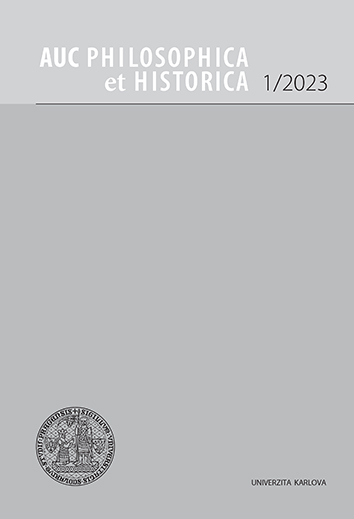AUC Philosophica et Historica (Acta Universitatis Carolinae Philosophica et Historica) is a multidisciplinary academic journal focused on the humanities with more than 50 years of tradition.
The journal is indexed in CEEOL, DOAJ, and EBSCO.
AUC PHILOSOPHICA ET HISTORICA, Vol 1968 No 4 (1968), 89–103
Ke klasifikaci definic pojmu inteligence v sociologické literatuře
[On Classification of the Definitions in Sociological Writings of the Concept Intelligentsia]
Jan Sedláček
DOI: https://doi.org/10.14712/24647055.2018.171
published online: 16. 01. 2018
abstract
While the concept intelligentsia is commonly applied today by sociologists taking the Marxist theoretical approach and is commonly used in the everyday life of socialist countries, its meaning is far from precise. The widespread tendency to see the “intelligentsia” as a single, internally integrated group can hardly find its theoretical justification today. There have, of course, been times and countries in which the workers by brain constituted a special social stratum with a relatively high degree of integration. This was especially the case in some of the less developed countries of central and eastern Europe during the past century and at the beginning of the present. In the West, however, a similar stratum was never to be found. There were several causes for this and the article attempts to elucidate them. Although we may recognise that some European countries possessed in the last century a fairly idependent and unified stratum of intelligentsia, as the conditions giving rise to it were gradually eliminated, it lost this character. Today we find these countries, too, as a rule at the stage when people who were classed among the intelligentsia mainly because of their education and their mental work often show such social disparities that their inclusion in a single social group is unfounded. Nevertheless, there are still theoreticians and politicians who try to treat the intelligentsia as a single entity. The attitude stems from two circumstances: 1. adherence to the traditional idea of the intelligentsia, 2. a simplified view of class structure in capitalist and, especially, socialist society; until recently this was proclaimed as a consistent Marxist approach, but it was based on some of the distorted and vulgarised views propagated by Stalin. Attempts to define the intelligentsia as a specific social entity have in recent times inevitably run into difficulties because their purpose was to force socially quite distinctive categories into a single compartment. Such definitions never succeeded in encompassing the group as a whole, but were confined to the part that the given author considered to be the most important. Hence the multiplicity of definitions to be found in theoretical writings and the extraordinary variety of guises accorded to the intelligentsia in current thinking. Today we also have a number of attempts to classify these definitions. The article mentions those by Volfson, Bláha, Źarnowski, Szczepański and Wojcik. The classification is no easy matter, mainly because the definitions date from various periods and are by authors living under differing social orders. Two conclusions follow: 1. The approach has to be historical; definitions that seem quite unsuitable today may in their day have been fairly exact descriptions of the subject under investigation. 2. We have to distinguish between the work of western authors and those from eastern Europe because the former usually have in mind only one section when speaking of the category of intelligentsia, i. e. the intellectuals or creative intelligentsia, while the eastern European writers as a rule include all workers by brain. We consider that the following classification provides the most suitable basis for analysing the definitions of intelligentsia and intellectuals to be found in the sociological writings of different countries: 1. Definitions delimiting the said category by means of actual, apparent or postulated characteristict of the intelligentsia: 1. definitions delimiting the intelligentsia by certain psychic characters, 2. definitions delimiting the intelligentsia by higher levels of education than are common in the given community, 3. definitions based on moral qualities of the intelligentsia, II. Definitions delimiting the intelligentsia by means of actual, apparent or postulated social position and functions: 1. definitions of the intelligentsia based on a special mission in society, 2. definitions based on their creative relationship to culture, 3. definitions referring to a sum of certain professions, 4. definitions referring to their place in the social structure: a) the intelligentsia is briken down among different classes, b) it is regarded as a distinct class, c) it is equated as a whole with the bourgeoisie, d) it is equated as a whole with the proletariat, e) it is regarded as part of new, so-called middle classes, f) it is regarded as a distinct social stratum.
